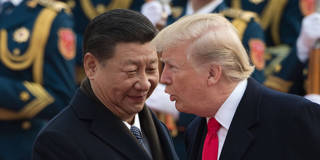Chinese negotiators recently offered to buy enough American products to reduce the bilateral trade deficit to zero by 2024. Why, then, have US negotiators rejected that as a way to end the dispute?
CAMBRIDGE – The current conflict between the United States and China is not a trade war. Although the US has a large trade deficit with China, that is not the reason why it is imposing high tariffs on imports from China and threatening to increase them further after the end of the current 90-day truce on March 1. The purpose of those tariffs is to induce China to end its policy of stealing US technology.
The Chinese government refers to the conflict as a trade war because it hopes that buying large quantities of American products will lead the US to end its tariffs. The Chinese negotiators have recently offered to buy enough US products to reduce the trade deficit to zero by 2024. Tellingly, the US negotiators have rejected that as a way to end the dispute.
The US wants China to stop requiring American firms that seek to do business in China to have a Chinese partner and to share their technology with that partner. That policy is explicitly forbidden by World Trade Organization rules, which China has been obliged to respect since they joined the WTO in 2001. The Chinese deny that they are violating that rule, arguing that US firms are not being forced to share technology: they do so voluntarily in order to have access to the Chinese market and to Chinese production opportunities. But American firms regard China’s behavior as a form of extortion.

CAMBRIDGE – The current conflict between the United States and China is not a trade war. Although the US has a large trade deficit with China, that is not the reason why it is imposing high tariffs on imports from China and threatening to increase them further after the end of the current 90-day truce on March 1. The purpose of those tariffs is to induce China to end its policy of stealing US technology.
The Chinese government refers to the conflict as a trade war because it hopes that buying large quantities of American products will lead the US to end its tariffs. The Chinese negotiators have recently offered to buy enough US products to reduce the trade deficit to zero by 2024. Tellingly, the US negotiators have rejected that as a way to end the dispute.
The US wants China to stop requiring American firms that seek to do business in China to have a Chinese partner and to share their technology with that partner. That policy is explicitly forbidden by World Trade Organization rules, which China has been obliged to respect since they joined the WTO in 2001. The Chinese deny that they are violating that rule, arguing that US firms are not being forced to share technology: they do so voluntarily in order to have access to the Chinese market and to Chinese production opportunities. But American firms regard China’s behavior as a form of extortion.